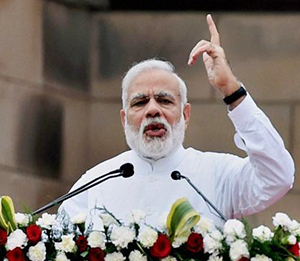New Delhi, Aug 6: In his first comments on the violence against Dalits by cow vigilantes, Prime Minister Narendra Modi today strongly rebuked them, saying most of them are "anti-social" elements who are running "shops" in the name of cow protection which makes him "angry".
He asked state governments to prepare "dossiers" on the so-called cow protectors as 80 per cent of them do illegal activities at night and become cow protectors in the day, asserting that running such help groups does not mean harassing others.
Modi's made the sharp denouncement of cow vigilantes during his Town Hall-style address to mark the second anniversary of his government's MyGov initiative.
His comments come at a time when his government and BJP are facing flak over incidents of violence against Dalits and Muslims by cow vigilantes in various states including Uttar Pradesh, Gujarat and Madhya Pradesh.
"It makes me angry that people are running shops in the name of cow protection. Most of them are anti-social elements hiding behind the mask of cow protection.
"I will ask state governments to prepare a dossier on such people as 80 per cent of them will be found to be involved in anti-social activities which no society will approve of," he said.
Noting that more cows die from consuming plastics than are slaughtered, he said those who want to serve the animal should rather work towards stopping cows from eating plastics as that will be a bigger service.
Recalling his own work in the service of cow, he said at one health camp organised by him for the animal, at least two buckets full of plastic were removed from the stomach of one of them.
On the foreign policy front, the Prime Minister said "India first" is the central point of his government's diplomatic engagements.
"India first is the central point (of our foreign policy). It is about protecting India's strategic interest, it is to ensure that India marches forward in achieving economic prosperity by leaps and bounds and reaches the position which it is destined to reach," Modi said.
The Prime Minister said time has changed and world has become interdependent, and no country can afford to live in a particular group.
"The time of grouping has come to an end. Every country is linked to some other country," he said, adding walking together in most cases has become the norm.
Showering praise on the Indian diaspora, he said they can play an important role in strengthening India's ties with foreign countries and we should utilise their strength.
"The diaspora community has become very proactive, assertive and they can help in improving ties with many countries. India is making its place (in the world) with new energy and prestige," he said
Answering a query on India's external engagement, Modi said there was no need to use words like aggressive, progressive and proactive in talking about the country's foreign policy which the questioner had used.
Also Read: Fake cow protectors should be exposed, severely punished: PM Modi





Comments
Ha ha What a statement! India First and need to improve the economy. By what ? Exporting Beef? Already we are number 1 in exporting beef. Mainly export is from Gujarat. Gujarat Is going to lose. This is trying to save the face. If Dalits and patidars unitd, then this is the exit point for the current govt.
this is just for media and for cow protectors \you do whatever you want\""
What action you going to take on them????
May be the cheddis are exposed now... our PM want to be SAFE and he is FORCED to break his Silence... what a cow brigade ... and wat a cheddi plan ... Every evil they plot ... its getting exposed day by day...
Pm modijii i appreciate u r anger on them but very late ur,
But talk against bd and vhp and put them inside the jail
Joke of the year, he thought all are stupids to believe what he barking
Preaching will not bring any change.
Name your own party BJP, VHP etc if you have courage.
This statement only for public but reallits is see the link of YouTube http://youtu.be/1HGLgCmBlbA
Add new comment